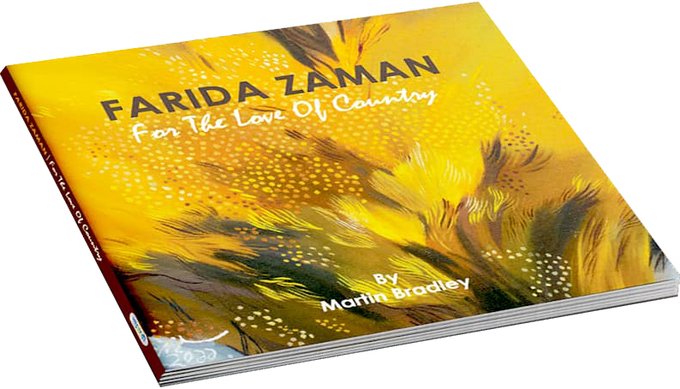Wednesday 26 February 2014
100 words for Indian artist Madan Lal
Urban Phulkari is a modern age, fifty four inch by fifty four inch, tapestry intricately woven of acrylic colours and spray paint onto canvas. It revels in symbolisms which meld the ancient with modernity, in an all encompassing glance at Indian urban life.
Red lipped angelic faces are counterpointed with the images of serene bulls amidst which, at first glance, appears to be a cacophony of symbol and colour, but which reveals itself to be an instructional diorama of the complexities of contemporary living. An overall warm palette brings the brightness of Mother India into golden sunbeams and Rajasthani pinks.
Wednesday 5 February 2014
Into the Light, Space Gambus Experiment's third album
Kamal Sabran’s Space Gambus Experiment (SGE)’s third orbital pass - Into the Light, fairly bursts into the woolly stratosphere of our collectively cloudy minds with all the pent-up sunshine and strident musical energy/excitement of an efficaciously euphonious explosion.
Though, obviously, the third in an extant trilogy of musical albums - think Return of The King, sooner or later SGE’s Silmarillion will appear and make us all redefine our knotted notions of fusion, music and harmonics. Until then, Into the Light brings us the continuing saga of progressive, spaced-out, music ala the equator’s very own experiment with gambus and space.
As an opening track, Pegembara cahaya vii flares into our consciousness with a steady, thumping, heartbeat of drums. This is masterfully overlaid with a melancholic gambus tugging at our heart and mindstrings. It is a rocking little number, reminding us all that SGE are, at heart, still rockers. As an opening track it is well designed to get us out of our seats …and dance? Dance perhaps like some equatorial, robotic, nuevo Gary Numan. I am bound to say (as I did for their last album review) that somewhere in the harmonics of this number is a vague reminiscence of Fritz Laing's uber Sci Fi film Metropolis, and the incumbent music of Gottfried Huppertz defining both modernism and expressionism. When the electrics grab hold - beware! It is as if the kings of krautrock - Kraftwerk, in league with some demonic Werner Herzog biting Nosferatu, have invaded Asia, as opposed to Peru, with their enigmatic, rhythmically pounding mellifluousness, setting about claiming the jungles as theirs with a post-modern sturm und drang Musique Concrete.
Like all good albums there are continuing refrains, musical links if you like, which hold disparate concepts together. In Only from the heart can you touch the sky, a solitary gambus sounds somewhere in space. This is curtesy of Mr Sabran’s archive of (literally) celestial sounds. It is the heart of sound, a heart full of sound and a heartful sound ricocheting from a space tuned and retuned as our senses adjust to an overdrive which seems interstellar bound and machined in silver.
For much of this remarkable third album, titillating tracks occasionally oscillate between Kraftwerkian krautrock, with an Asmovian stomp, and a subtler Tangerine Dreamery. At times there are pounding, robotic vocals, echoing as if through some futuristic Caves of Steel, in sync with the musical notions of Kraftwerk rather than Tangerine Dream, Amon Düül II or Can. At other times a gambus, now a solid symbol for the fusion of East/West harmonics, once again echoes amidst cosmic electric crackles. Is it gold buried Smaug or some deeply dreaming Troll King awaiting either a Bilbow burglar or a Per Gynt to awaken their echo deep inside some mythic, metaphoric mountain, or is it the soul’s memory.
Numbers like You have to breaking your heart until it opens; project a solid bass heralding virtually ecstatic electronics as we await the instructional ‘voice’ of a prototype model of some robotic voice synthesiser in this catchy, practically dance, number. Other tracks hold a gutsy beat which serves to meld this space melange together - threaded with the ubiquitous gambus. After listening I am left with the question - just what is it that reminds me of early Hawkwind (before Lemmy’s leaving).
Altogether this album is a progression over the last two and, perhaps, we might still witness some melding of native vocals and poetry, with the celestial sounds, before too long. The robotic vocals do give this album an added depth, but SGE must be careful not to overuse such gimmickery in the future and move on from tributes to the golden age of progressive music, to creating more of their own uniqueness.
Subscribe to:
Posts (Atom)








